
|   |

|   |
 e-mail: ukb7@rediffmail.com Excellent exotica Photos: Saswata Chatterjee March 23, 2021 Chetana, the celebrated theatre group from the eastern metropolis under the baton of the thespian Arun Mukhopadhyay, would earn its golden jubilee laurels by next year and has been known in India and abroad for several of its landmark productions over the half century of its existence. Indeed, one of its early productions Jagannath mounted in1977 with Arun himself in the eponymous role, made a performance history for group theatre and ran for a spectacular number of nearly 1000 shows, as was proudly announced in the international press conference by the director of Bharat Rang Mahotsav in the capital sometime in the early 2000s. Here is a quick word on the play's overarching excellence. Jagannath was an adaptation of Lu Xun's Chinese novella, The True Story of Ah-Q, and was indubitably a legendary production of Bengali theatre. Re-worked and Indianised, Arun's character Jagannath was a poor, uneducated villager. All the villagers disregarded him and people of higher ranks did not even consider him to be a human being. No matter what wrongful or unjust treatment he was subjected to, there was no inclination in him to protest or to resist. At the end of the story, when Jagannath was charged with sedition by the then regime and sent to the gallows (on a false charge of being a "revolutionary"), the protagonist made an eloquently defiant gesture against the conspiring world and voluntarily got the noose round his neck! In fact, that defiant laughter of his still rings out in the face of all the oppressive powers on earth, who level such wrong charges of sedition against their innocent victims, just as Nora's slamming the door on her husband's face - at the end of Ibsen's The Doll's House echoes and re-echoes against the global patriarchal society through the centuries, as trenchantly noted by George Bernard Shaw. Kusum Kusum and Girgiti presented on proscenium stage on February 28 by Chetana were equally eloquent productions, especially after the pandemic times! While the first play was an adaptation from Girish Karnad's Flowers, a grim tragedy with deep folk roots, the second one was a heady comedy - again an adaptation from Safdar Hashmi's Gurgit and rooted, in turn, in Anton Chekov's Chameleon - and a boisterous take on the quirky ruling class! KUSUM KUSUM 
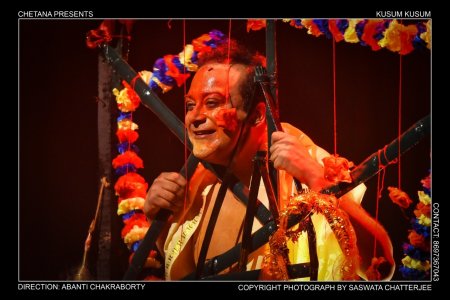
Flowers, in Karnad's original version, was a dramatic monologue about a devoted and pious priest who violates both 'dharma' and'bhakti' because of his carnal love for a courtesan. Torn between his devotion to the deity and his infatuation for the "public woman" - alongside his loyalty to the King and his filial duty to his wife -- the priest narrates in the play, the story of his life after matters have come to a head and all his loves and duties collide on a single night, after the King has hauled him up for debauchery and challenged him to die unless he can be saved by a "living" divinity! For the staged version in 2006 at Delhi's NSD Festival (seen by this critic) as the curtain raiser - masterly directed by Royston Abel and enacted beautifully as a soliloquy by Rajit Kapoor, Karnad had remarked, "Flowers is based on the folklore from Chitradurga region of Karnataka. The tale deals with the metaphysical dilemma that would result if God were truly merciful and all forgiving. Would God's grace ignore moral turpitude? What has greater weightage in the cosmic order of things - faith or morality? The Indian philosophical tradition never treated what would be called moral philosophy as a separate discipline. But the painful, moral concerns are very much alive and find expression in epic stories or narrative literature or, as here, in tales orally handed down." Kusum Kusum, Chetana's Bengali version under review, was very capably directed by Abanti Chakraborty who takes a step forward and introduces the visible, yet haunting presence of the public woman: sauntering freely to and fro, spreading fragrant blossoms, often symbolising the veiled goddess and even daringly mimicking on stage their passionate coital union. The bare-all mimetic action by Kusum (imaginatively handled by Nibedita Mukhopadhyay) could possibly be visualised only by a lady director! The priest's life-and-death soliloquy (superbly handled by Sujan Mukhopadhyay) was as adroitly delivered as could be expected of this seasoned actor. Again, his no-holds-barred physical acting spread over the whole stage, was no less captivating than Rajit Kapoor's dignified sitting priest, perched on a high platform right in front of the spectators facing the stage, while playing the role only with movements of the upper torso. 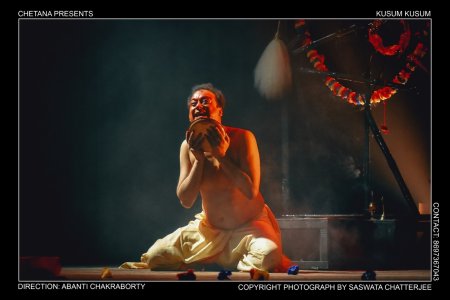
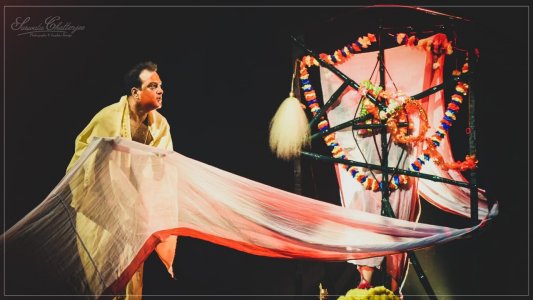
Excerpt from interview with the director: How did you interpret Karnad's monologue as your text? The complex text deals with the philosophy of religion and tries to answer questions related to power, God, love, desire, justice and forgiveness. The core conflict between love and lust, power and struggle for existence, desire and morality, et al., has been depicted in this strong text.The actors participated in the artistic process of interpreting the text to performance. Could you please explain your introduction of Kusum on stage? The silent physical presence of the female body was important for me to build a string with the facts and thoughts of the male protagonist. The play revolves around a married priest who worships the goddess, but stumbles when he falls for the courtesan and faces the challenge of the king, the power! Yes, I did make her mumble once: how she was purified by the touch of the high priest and technically made the script a dialogue (and not monologue), but I thought it was essential to carry conviction. Your use of the sublimely spiritual Tagore song: When I reach His gates to seek His alms, / What I receive I seem to lose the same instant... seems very pivotal for your play... Yes, that's true. I was looking for a musical ambience for the play. Once I just heard Sujan hum that tune and it immediately struck me to be perfect for the message I was intending to convey through the entire performance! What's the overall message you sought to convey? To me, the dramatic monologue is meditative as well as theatrical. Memory and predictions, dilemma and anxieties are the key psychological components which I tried to explore through the theatrical devices and performance style. GIRGITI 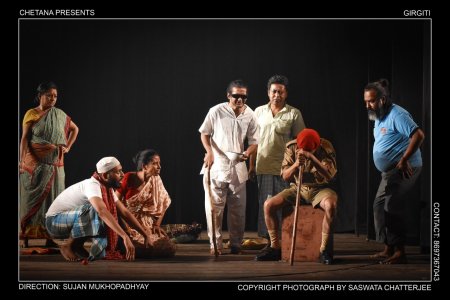
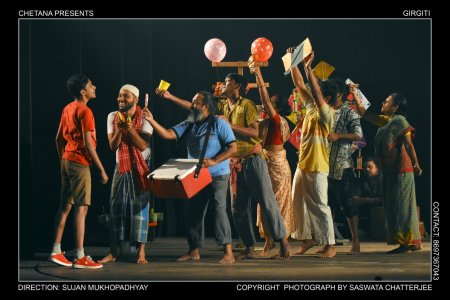
As Chetan's second offering in the same evening, this play had an uproariously funny tale to tell, rooted in an 1884 short story by Anton Chekov. In the Russian original, a drunkard has had his finger snapped by a small dog (according to one witness, after thrusting a cigarette stub into the latter's mouth!). While ostensibly investigating the matter, the policeman's attitude to the affair and the dog's future destiny fluctuated wildly, depending upon the in-flowing information as to who the owner of the culprit (puppy) might be! More than a century later, for the Jana Natya Manch (performing street theatre in Delhi and its neighbourhood), their eminent director and also a gifted Urdu playwright, Safder Hashmi created a dramatic adaptation where he replaced Chekov's puppy with a kid, which heighted the theatrical possibilities immensely! Its Bengali adaptation, Girgiti, by Arun Mukhopadhyay had a very successful production run some thirty years back, with the noted actor Dwijen Mukopadhyay essaying the pivotal policeman's role. Now directed by Sujan Mukhopadhyay in a truly slapstick style, the dramatis personae were the younger members of the group who put in their best efforts under Sujan's baton. Imagine the milieu: a country market where the sellers of sundry items are desperately in need of customers. There walks in an urchin, curiously looking at the sales ware and helping himself to the commodities from the only too willing vendors. The trouble starts when the latter ask the bedraggled boy to pay, who has no money! There has been a policeman handy, who had earlier sauntered in, collected his "dues" and promptly gone to snooze. The commotion now wakes him up and he proceeds instantly to beat the boy. A passerby intervenes, announcing the boy to be police commissioner's son. The policeman immediately changes colours and starts cuddling the boy. "Confusion is worse confounded" when it is pointed out to be a mistake, and the boy's beating starts all over again! The commissioner's appearance to claim his missing child and "dismissing" the policeman from his job brings the story to a hilarious end! 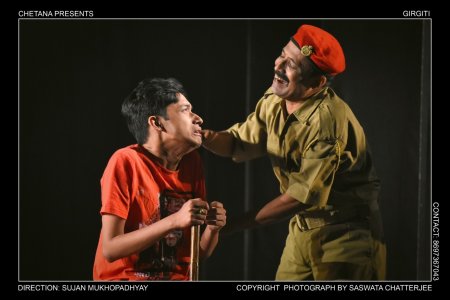 Excerpt from interview with director: What's the significance of the title? 'Girgiti' means chameleon that keeps changing colour -- here, changing own nature to relish power. This is a universal human trait for all powers that be and will perhaps remain as long as we live! You have used ensemble acting style in the play... A roller-coaster ride of 40 minutes and the ensemble energy of the cast provoked me to use ensemble acting. In keeping with the deep satire of power domination on the simple folks, I have also used ensemble singing of folk melodies, without recourse to any well-known folk tune. On the issue of power domination, the policeman's role seems to be crucial... Absolutely. In fact, at one stage I was toying with the idea of doing that role myself. But, you would agree that the newcomers to the stage have done their very best on the whole! Certainly, as long you don't allow the humorous comedy to degenerate into farcical excesses... I entirely agree. I do propose, for instance, to keep the commissioner's excessively fawning assistant and the oversleeping of the policeman both tightly under leash! 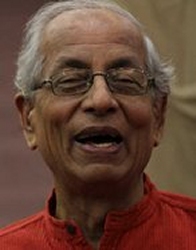 Dr. Utpal K Banerjee is a scholar-commentator on performing arts over last four decades. He has authored 23 books on Indian art and culture, and 10 on Tagore studies. He served IGNCA as National Project Director, was a Tagore Research Scholar and is recipient of Padma Shri. Post your comments Pl provide your name and email id along with your comment. All appropriate comments posted with name and email id in the blog will also be featured in the site. |